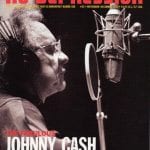Johnny Gimble – “The music came up from his soul”
The title of Johnny Gimble’s newest CD, Just For Fun, goes a long way toward explaining the man and his music. It would be naive to say that the money hasn’t been important to him; Gimble, after all, has been an extraordinarily commercial musician. But his sheer passion for music and his compulsion to share it with others have done the most to sustain him through his long and varied career.
Gimble has been making consistently good music for over sixty years. Mention his name and many people immediately remember him as the award-winning session musician who, along with Buddy Spicher and a few others, brought the fiddle back into prominence in Nashville in the 1970s after it had been virtually abandoned by mainstream artists. But that was more than twenty years ago. Others will think of his tenure as a Texas Playboy with Bob Wills. That was 50 years ago.
When he joined Wills in California in 1949, Gimble had already been making music in Texas and Louisiana for more than a decade. He hasn’t stopped. A stroke on Christmas Eve 1999 has slowed the master fiddler a little bit, but he’s still playing an occasional gig, making records, and teaching fiddling workshops in Texas and New Mexico. The satisfaction of seeing, as Johnny terms it, “the light bulb go off,” when a young musician masters a difficult chord or, better yet, puts an “original” spin on a tune, is more than enough to keep Gimble busy teaching the apprentices who make the trek to Taos.
When Johnny Gimble entered the world on May 30, 1926, in the Chapel Hill community near Tyler, Texas, he could scarcely have avoided the sound of the fiddle. In many ways East Texas remained a cultural outpost of the Old South. Confederate statues still guarded courthouses in virtually every county seat, and a biracial population, Democratic political leanings (with a strong populist flavor), and evangelical Protestant religious preferences provided evidence of the region’s kinship with Dixie.
Although young men in this part of Texas typically wear cowboy hats, boots and jeans, their society was a product of the mid-19th-century migration that brought the Gimbles and people like them from Georgia and other Southeastern states. Marked by heavily wooded rolling hills and red dirt (except for the sandy lands where Tyler’s famous rose fields flourished), the region still knelt before the throne of King Cotton.++++++++++++++++++++++++++++++++++++++++
This is an excerpt of the full article which appeared in The Best of No Depression: Writing About American Music, which features 25 of the finest articles from the magazines back issues, and was published in 2005 by University of Texas Press to help celebrate the magazines 10th anniversary. Due to our agreement with UT Press we are unable to include this article in our online archive.
The Best of No Depression is the only place you can find these articles other than our back issues. Visit the No Depression store to buy your copy for only $10.
The 300-page volume includes co-editor Grant Aldens award-winning 2001 feature on Billy Joe Shaver, co-editor Peter Blackstocks 1998 Artist of the Decade piece on Alejandro Escovedo, senior editor Bill Friskics-Warrens 2002 cover story on Johnny Cash, contributing editor Paul Cantins deep exploration of Yankee Hotel Foxtrot-era Wilco; and many other high points from our print heyday.
Table of contents for The Best of No Depression:
Preface, by Grant Alden and Peter Blackstock
Los Lobos, by Geoffrey Himes
Alejandro Escovedo, by Peter Blackstock
Jon Dee Graham, by Peter Blackstock
Billy Joe Shaver, by Grant Alden
Ray Wylie Hubbard, by John T. Davis
Flatlanders, by Don McLeese
Ray Price, by David Cantwell
Johnny Gimble, by Bill C. Malone
Johnny Cash, by Bill Friskics-Warren
Rosanne Cash, by Lloyd Sachs
Lucinda Williams, by Silas House
Buddy & Julie Miller, by Bill Friskics-Warren
Kasey Chambers, by Geoffrey Himes
Loretta Lynn, by Barry Mazor
Patty Loveless, by Bill Friskics-Warren
Kieran Kane, by Peter Cooper
Paul Burch, by Jim Ridley
Hazel Dickens, by Bill Friskics-Warren
Gillian Welch, by Grant Alden
Ryan Adams, by David Menconi
Jay Farrar, by Peter Blackstock
Jayhawks, by Erik Flannigan
Wilco, by Paul Cantin
Drive-By Truckers, by Grant Alden
Iron & Wine, by William Bowers




